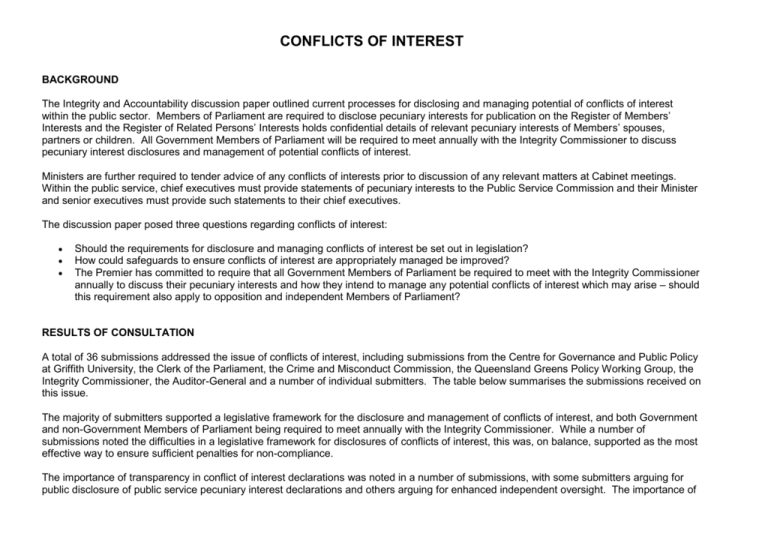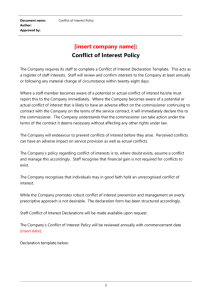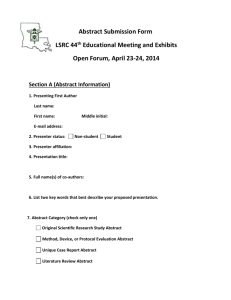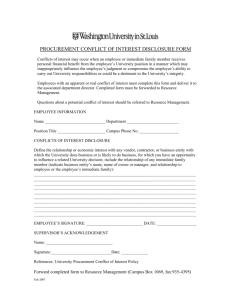CONFLICTS OF INTEREST - Department of the Premier and Cabinet
advertisement

CONFLICTS OF INTEREST BACKGROUND The Integrity and Accountability discussion paper outlined current processes for disclosing and managing potential of conflicts of interest within the public sector. Members of Parliament are required to disclose pecuniary interests for publication on the Register of Members’ Interests and the Register of Related Persons’ Interests holds confidential details of relevant pecuniary interests of Members’ spouses, partners or children. All Government Members of Parliament will be required to meet annually with the Integrity Commissioner to discuss pecuniary interest disclosures and management of potential conflicts of interest. Ministers are further required to tender advice of any conflicts of interests prior to discussion of any relevant matters at Cabinet meetings. Within the public service, chief executives must provide statements of pecuniary interests to the Public Service Commission and their Minister and senior executives must provide such statements to their chief executives. The discussion paper posed three questions regarding conflicts of interest: Should the requirements for disclosure and managing conflicts of interest be set out in legislation? How could safeguards to ensure conflicts of interest are appropriately managed be improved? The Premier has committed to require that all Government Members of Parliament be required to meet with the Integrity Commissioner annually to discuss their pecuniary interests and how they intend to manage any potential conflicts of interest which may arise – should this requirement also apply to opposition and independent Members of Parliament? RESULTS OF CONSULTATION A total of 36 submissions addressed the issue of conflicts of interest, including submissions from the Centre for Governance and Public Policy at Griffith University, the Clerk of the Parliament, the Crime and Misconduct Commission, the Queensland Greens Policy Working Group, the Integrity Commissioner, the Auditor-General and a number of individual submitters. The table below summarises the submissions received on this issue. The majority of submitters supported a legislative framework for the disclosure and management of conflicts of interest, and both Government and non-Government Members of Parliament being required to meet annually with the Integrity Commissioner. While a number of submissions noted the difficulties in a legislative framework for disclosures of conflicts of interest, this was, on balance, supported as the most effective way to ensure sufficient penalties for non-compliance. The importance of transparency in conflict of interest declarations was noted in a number of submissions, with some submitters arguing for public disclosure of public service pecuniary interest declarations and others arguing for enhanced independent oversight. The importance of the role of the Integrity Commissioner was emphasised, with a number of submissions arguing for expansion of this role, incorporating a more active engagement with Members of Parliament. SUGGESTIONS Specific suggestions for improvements included: Strengthen links and partnerships between review bodies (including Integrity Commissioner, Queensland Audit Office, Crime and Misconduct Commission and Queensland Ombudsman) and establish a centralised system for receiving and directing complaints (James and Kath Robertson). Expand role of Integrity Commissioner to include overview of the Register of Members’ Interests, chief executive and senior executive declarations, with biannual meetings being conducted (James Myers). Establish an all-party Parliamentary committee based on the UK model to oversee the ethical standards regime (Centre for Governance and Public Policy, Griffith University). Strengthen penalties that attach to non-disclosure and make consequences of non-compliance more effective (Centre for Governance and Public Policy, Griffith University and Monash University Accountability Round Table). Review the Public Service Commission’s procedures for monitoring lodgement of chief executive declarations, including introducing annual compliance audits (Crime and Misconduct Commission). Integrity Commissioner should be appointed by the Crime and Misconduct Commission to enhance independence (Queensland Greens Policy Working Group). Introduce new laws that regulate conflicts of interest arising between employment in the private sector and post-public sector employment of senior public officers (Clerk of the Parliament). Open public officials’ registers of interests to public scrutiny or provide to watchdog agencies such as Crime and Misconduct Commission, Ombudsman or Auditor-General (Dr Mark Lauchs). Consider amending the Public Sector Ethics Act 1994 to allow the Integrity Commissioner to provide advice to Members of Parliament without written requests and consider amending the Standing Orders to allow the Integrity Commissioner to access the Register of Related Persons’ Interests (Integrity Commissioner). No. Submitter Name 5 Mr Gary Scanlan 9 11 Ms Margaret Mack Mr James and Ms Kath Robertson Q3 - Should the requirements for disclosure and managing conflicts of interest be set out in legislation? Q4 - How could safeguards to ensure conflicts of interest are appropriately managed be improved? No. Seems to be an unnecessary step and the difficulties faced in interpreting current guidelines (e.g. the Premier’s holiday at a friend’s house in Sydney) would only be carried over to the legislative arena. There are sufficient sanctions available if an MP or public servant is found to have acted with a conflict of interest. It is important that the focus be on the mischief meant to be avoided i.e. the conflict of interest, rather than some minor error or oversight on the Pecuniary Interest Register. Certain areas of private industry should be required to make similar disclosures, but that is not under consideration here. Yes, Not necessarily. What’s important is that people can easily access information on what is required in terms of disclosure and they need to be able to get advice that is in plain English i.e. not legalistic. No change is required. Greater transparency required. Improve separation of powers e.g. Ministers strategic policies and legislation. Public Service implement strategies and enforce law. A third independent sector - review and assess performance. A third sector required because many high level positions are political appointments. Should DGs and other CEOs make a pledge to serve the public first without fear or prejudice? Another important principle is to not allow someone to make decisions on benefits, entitlements or matters that can directly advantage them. An independent tribunal headed by a person with bi-partisan support should determine appropriate entitlements and guidelines for Members, Ministerial Offices, and the Opposition’s Office free of political interference. Continuously develop and improve review mechanisms. Perhaps all the review bodies (e.g. Integrity Commissioner, QAO, CMC, Ombudsman etc) should have stronger links and partnerships with each other. e.g. have a centralized complaints office where a complaint is recorded and directed to the relevant experts for review and reply. None of these offices should be part of a department. Q5 - The Premier has committed to require that all Government Members of Parliament be required to meet with the Integrity Commissioner annually to discuss their pecuniary interests and how they intend to manage any potential conflicts of interest which may arise – should this requirement also apply to opposition and independent Members of Parliament? Yes. The Opposition plays a vital role in democracy in that it contributes to the debate over matters of importance. While its members may not be decision makers per se, they are influencing the process and so discussion of possible conflicts would be beneficial. Yes, provided the Integrity Commissioner and their office is 100% independent and appropriately qualified to give advice. Confidentiality will be of vital importance. No. Submitter Name Q3 - Should the requirements for disclosure and managing conflicts of interest be set out in legislation? Q4 - How could safeguards to ensure conflicts of interest are appropriately managed be improved? Adopt the principle of publicity. Anglo-Saxon principle where everybody was concerned with the activities of everybody - the more a person owned, the greater the obligation to protect the community. This will better ensure that the public is aware of interests and any conflicts. Declare everything – if there is any doubt, don't get involved. 13 Dr Stanley Robinson Yes, including that no person can decide or vote on a project where a conflict arises. 15 Mr Colin Hambrecht Yes. 31 36 39 Ms Alison Christou Mr Peter Kinsella Mr James Myers Need complete exposure of public spending. Yes. Every benefit should be recorded. Through open disclosure. Should be compulsory reporting of apparent of actual conflicts of interest. 40 Moreton Bay Regional Council Current arrangements for councillors are robust enough. 50 51 Mr John Van Der Klugt Mr Ian Smith Yes. Too difficult to draft for contingencies. 58 Corruption Prevention Network 68 LGAQ 82 Ms Chris Lawson Yes in s 26 Public Service Act. Also, each person who writes a brief for Minister should describe their interest in the situation. Yes, provided the laws have universal application to all public sectors. No. Should be included in the Agencies Audit Program and reported - MBRC already has this practice in place. Police checks - Auditor-General to administer Appoint independent umpire if one party requests one. In the public service, an annual certification should be included in the PPA process. By way of a single code of conduct for the public sector. These matters should be included in the AuditorGeneral’s audit program for government agencies. Q5 - The Premier has committed to require that all Government Members of Parliament be required to meet with the Integrity Commissioner annually to discuss their pecuniary interests and how they intend to manage any potential conflicts of interest which may arise – should this requirement also apply to opposition and independent Members of Parliament? Annually is not enough. Should be quarterly declarations of interest to the Integrity Commissioner for review. An annual report should be made public. This should apply to all MPs. Yes. Yes. Also, Integrity Commissioner should have expanded role. Broadened legislative power to ensure overview of register of interests of all MPs, agency CEOs and SES staff with bi-annual meetings. Agrees in principle - but this is not a matter for MBRC to comment on. Yes - also senior staff. No. Yes, should also apply to local councillors and GOC board members. Yes. Yes. However, the Integrity Commissioner has been excluded from operating in the Local Government arena, this needs to change. It is recommended that the Integrity Commissioner be resourced via the prevention arm of the CMC and other similar prevention arms of other agencies. Consideration also needs to be given to publishing decisions of the Integrity Commissioner, similar to the Information Commissioner. No. 84 94 Submitter Name Q3 - Should the requirements for disclosure and managing conflicts of interest be set out in legislation? Q4 - How could safeguards to ensure conflicts of interest are appropriately managed be improved? Centre for Governance and Public Policy, Griffith University Yes. The Centre would argue for an all-party committee approach to these issues (see the UK model) supported by good research, and with the added (revolving) membership of a senior judicial officer and an academic adviser involved in a relevant research field. The rules should also extend to conflicts of interest by members of Ministers' staff. The Centre also urges a review of the effectiveness of current Qld Parliamentary Committees with a view to strengthening their capacity for research and bipartisan assessment of issues. Yes. The real issue lies in the penalties that should attach to non-disclosure. This might be a monetary fine equal to twice the gain arising from the benefit of the conflict of interest, and extending to dismissal from Parliament or from public office in extreme cases. 100 Ipswich Koala Protection Society Mr George Slatter 102 Clerk of Parliament If there is a conflict of interest it is necessary for this to be declared and abstain from voting or influencing the final decision. There must be new laws that regulate conflicts of interest arising between employment in the private sector and business and post-public sector employment of senior public officers. Careful consideration is needed in the formulation of such laws, but they need to recognise and prevent officers who have decision making powers making decisions that effect business and then those officers benefiting later from that business, including post-employment with that business. Q5 - The Premier has committed to require that all Government Members of Parliament be required to meet with the Integrity Commissioner annually to discuss their pecuniary interests and how they intend to manage any potential conflicts of interest which may arise – should this requirement also apply to opposition and independent Members of Parliament? Yes. No. Submitter Name 106 Crime and Misconduct Commission 107 108 Mr Colin Forrest Monash University Accountability Round Table 128 Birkdale Progress Association Inc Q3 - Should the requirements for disclosure and managing conflicts of interest be set out in legislation? Q4 - How could safeguards to ensure conflicts of interest are appropriately managed be improved? Recommends that the Public Service Commission review its procedures to initiate a monitoring system for the lodgement of CEO Declarations of Interest, introduce an annual compliance and currency audit, and store declarations where they can be reliably located if required. Also recommends that the requirement to make a Declaration of Interests to the Minister and the Public Service Commission be extended to include all senior officers occupying positions which have delegations comparable in responsibility to a CEO or SES4 position. In addition, recommends that ethics education programs include adequate attention to: (i) declaration and recognition of non-pecuniary interests; (ii) conflicts of interest which disadvantage or cause a detriment. Yes. Yes. The requirement of initial notification and of subsequent changes within one month of the Member becoming aware of the changes is probably a reasonable timeframe. The consequence of non-compliance should be made clearer and more effective to encourage compliance. Recommend that upon the Presiding Office being satisfied (on the basis of evidence from any source) after reasonable inquiry and natural justice that the Member has failed to disclose, within 28 days, full details of a material interest of which he or she should reasonably have been aware, the Presiding Officer should "name" the Member and recommend that the Member should be suspended from the House. The suspension should provide that it be lifted only when the Presiding Officer has established that the Register's record has been corrected. Declaring an interest is insufficient protection as there are other ways of influencing outcomes (public servants/policy prioritisation). Q5 - The Premier has committed to require that all Government Members of Parliament be required to meet with the Integrity Commissioner annually to discuss their pecuniary interests and how they intend to manage any potential conflicts of interest which may arise – should this requirement also apply to opposition and independent Members of Parliament? Recommends that every MP be required to meet at least annually with the Integrity Commissioner. Yes. No. Submitter Name Q3 - Should the requirements for disclosure and managing conflicts of interest be set out in legislation? Q4 - How could safeguards to ensure conflicts of interest are appropriately managed be improved? All MPs should regularly meet with the Integrity Commissioner. 131 Queensland Greens Policy Working Group Yes. Without prescribing what is or isn't appropriate behaviour, it will be harder to confirm that a person has not acted appropriately in dealing with a conflict of interest. 134 Mr Andrew McMicking Yes. 142 NCWQ Yes. 150 Port of Townsville Limited As GOC standards are set out by ASIC, the courts and industry practice, it is not necessary for requirements to be set out in legislation for GOCs. 152 Mr Clem Campbell 153 163 Dr Linda Colley The Australian Collaboration Dr Mark Lauchs Queensland University of Technology Queensland Council for Civil Liberties 166 180 184 Sam Scanlon More attention should be given to the moral background of people who run for election. A review could be undertaken comparing the current system to ASX best practice principles to identify measures used in private sector not just utilised by Government. Also important that the public sector is regularly trained in this area. The term 'conflict of interest' needs to be reconsidered. It implies to the public that there is an illegal aspect for the decision make, when in reality many of the issues are those of competing interests for the decision maker, especially given the many roles politicians play. Yes. Yes Yes, only legislation can place sufficient penalties on breaches. Yes, should adopt CMC recommendations of report on Gold Coast City Council. Q5 - The Premier has committed to require that all Government Members of Parliament be required to meet with the Integrity Commissioner annually to discuss their pecuniary interests and how they intend to manage any potential conflicts of interest which may arise – should this requirement also apply to opposition and independent Members of Parliament? Of course. It would be foolish to suggest that only government MPs are prone to conflicts of interest which, if handled incorrectly, could be damaging to our body politic. The Integrity Commissioner, further, should be appointed by the CMC to avoid political interference and party political influence in the review of the interests of MPs. Yes. Yes. Yes. Yes Public officials should open register of interests to public scrutiny or provide to watchdog agencies such as CMC, Ombudsman or Auditor-General. Should establish independent statutory authority empowered to ensure compliance with legislation. Could be CMC but prefer revamped version of Integrity Commissioner. Senior public servants and Ministerial staff should complete publicly accessible pecuniary interests registers. Unnecessary - current system is sufficient. Notes workload and resourcing impacts on Integrity Commissioner. Yes, should apply to all MPs. No. Submitter Name Q3 - Should the requirements for disclosure and managing conflicts of interest be set out in legislation? 193 Dr David Solomon 195 Robert Beno Yes, as legislation will prevent tinkering and manipulation at a later date. 198 Auditor-General of Queensland Accountable officers must show a high level of care in the use of public funds. There should not be any bias, either real or perceived, in decisions concerning the expenditure of public monies, and waste or extravagance should be guarded against. All decisions should be properly documented and be subjected to all those checks necessary to guarantee the soundness of those decisions. Q4 - How could safeguards to ensure conflicts of interest are appropriately managed be improved? (1) Regular training for officers on managing conflicts of interest should be conducted, using CMC toolkit. (2) Recommends review of declarations of pecuniary interests - some statutory office holders including Integrity Commissioner not required to make declarations. Understands PSC is currently undertaking review to issue new guidelines. Removing ambiguity and imposing blanket bans on prescribed conduct. Conflicts should be disclosed in advance. The Integrity Commissioner's advice, who should not be a 'Toothless Tiger', should be sought by MPs and senior public sector employees regarding any potential conflicts of interest. Q5 - The Premier has committed to require that all Government Members of Parliament be required to meet with the Integrity Commissioner annually to discuss their pecuniary interests and how they intend to manage any potential conflicts of interest which may arise – should this requirement also apply to opposition and independent Members of Parliament? (1) All MPs should also raise issues with pecuniary interests declaration with Clerk of Parliament. (2) May be desirable to amend Public Sector Ethics Act 1994 to allow Integrity Commissioner to volunteer advice to MPs without need for written request for advice. (3) May be desirable to amend Standing Orders to allow Integrity Commissioner to access Register of Related Persons' Interests. Yes, all MPs and senior public sector employees/public officials should have to adhere to the same standards.






